News
The Class of '92
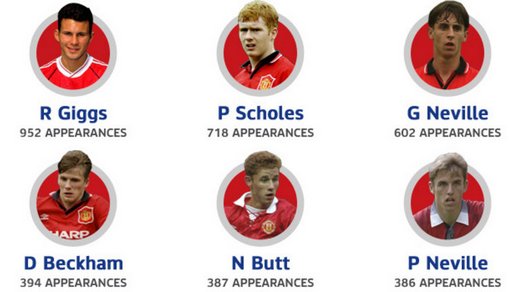
Ahead of Sunday's premier of the The Class of '92 in Manchester, Alex Dunn delivers his verdict and chats to directors Ben and Gabe Turner about the making of a feature film that charts the story of a special group of Manchester United players who went from the youth team to treble winners
If the greatest trick the devil ever pulled was convincing the world he doesn't exist, the finest accomplishment of a filmmaker is to convince its subject that the camera isn't really there. Paul Scholes' metamorphosis from curmudgeon to comic in The Class of '92 is testimony to the fact filmmaker brothers Ben and Gabe Turner have achieved the latter.
The feature length documentation of how six young lads graduated from the park to winning the FA Youth Cup in 1992 to permanently stitching their names into Manchester United's rich folklore with the treble seven years later is a joyous success.
With nigh on 100 years of media training between them, by their very conditioning the recollections of Gary and Phil Neville, Ryan Giggs, Paul Scholes, David Beckham and Nicky Butt should have been more guarded than those brought before the Leveson Inquiry. Instead, what comes through is a sense that this was a story they wanted to tell. From Scholes' collection of Charlie Brown-like expressions of bemusement to Phil Neville's slow motion re-enactment of his step-over (a Bafta-worthy scene on its own - 'I'd just done the best stepovers this club had ever seen and they're wetting themsleves. I'd been practising this for six months) to Giggs' emergence as a surprisingly natural storyteller, the overall feel is traditional buddy movie even if the narrative arc stays true to the conventions of the classic sports film.
The absence of either a narrator or a script is a risk on the part of the filmmakers and the trust they show in their protagonists to not fall into the footballer fail-safe mode of monotone proves inspired. Each of the six is interviewed separately but the real chemistry comes through when they are sat around the same table to share a few drinks. What could have been a nausea inducing Carling-style approximation of what it is to be male and have friends is instead genuinely funny as they quickly revert to type.
The Class of '92The Class of '92 will debut in selected cinemas across the UK from Sunday 1st December & will be available on DVD from Monday 2nd December
'Busy' Gary Neville concedes his limitations as a lady-wooer as a callow youth in comparison to Giggs, while Scholes remembers being locked in a tumble dryer. 'It probably brought on your asthma,' deadpans Butt. What Beckham was made to do with a Clayton Blackmore (a mahogany Welshman for those of you too young to remember the nineties) calendar as his initiation test would probably be considered bullying in these more liberal times but as Gorton-lad Butt attests with relish, 'it toughened you up'. A discussion of their favourite ever excuse given by Sir Alex Ferguson to explain why they were being dropped is another treat. It's not quite fly on the dressing room wall but it's as close as you're going to get.
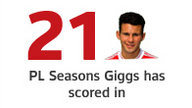 In many respect it's friendship - the kinship of a gang of disparate characters - that comes to the surface as much as the football. When to a man they pretty much concede those early days kicking a ball around with their mates at The Cliff were the best of their lives you're inclined to believe them. As an audience you're drawn to them as they're living out not just their own dreams, but a universal one we've all shared at one time or other. Whether it's a northern thing or due to their schooling at Old Trafford is by-the-by, but that they seem genuinely surprised at the careers they have fostered for themselves is both believable and touching. It certainly doesn't come across as faux-modesty.
In many respect it's friendship - the kinship of a gang of disparate characters - that comes to the surface as much as the football. When to a man they pretty much concede those early days kicking a ball around with their mates at The Cliff were the best of their lives you're inclined to believe them. As an audience you're drawn to them as they're living out not just their own dreams, but a universal one we've all shared at one time or other. Whether it's a northern thing or due to their schooling at Old Trafford is by-the-by, but that they seem genuinely surprised at the careers they have fostered for themselves is both believable and touching. It certainly doesn't come across as faux-modesty.
An absence of ego is a reoccurring trope throughout and it's perhaps surprisingly Beckham, and to a lesser extent Gary Neville, who take the back seat as Giggs, Butt and Scholes emerge as unlikely cinematic stars. When Bill Murray calls it a day Wes Anderson will have the perpetually laconic Scholes on speed dial.
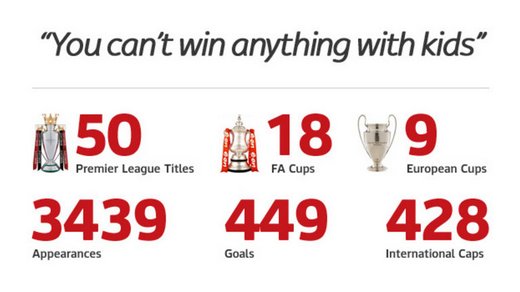
As with their previous films the Turner brothers look to contextualise the era with non-sporting contributors. Nineties nostalgia is mined for all its worth as Tony Blair, Mani of the Stone Roses and Danny Boyle are given airtime. At times it can feel a stretch to attempt to mirror the rise of new Labour with the Class of '92 but regardless of the fact hindsight ultimately revealed the mid-nineties to be more smoke and mirrors than a David Copperfield stage show, it would be churlish to argue that at the time this didn't feel like a period of optimism and change. Before Oasis started to cover themselves, before Britpop eventually ate itself by allowing the inception of Menswear, before the YBAs became more about prices than concepts, before Blair became Bono-like with his megalomania, Britain genuinely felt like the centre of something. Against that lot, the Class of '92 have done well to escape with their reputations unscathed.
There are also minor contributions from other members of the '92 youth team. The likes of George Switzer, Andy Noone and Raphael Burke are asked to specify what separated the chosen six from the best of the rest but it's the Nevilles, Giggs, Scholes, Beckham and Butt who are the real stars. Thankfully, a willingness to be open in a manner largely at odds with their public personas - at least for those that have chosen to shun the limelight - makes for a film that does justice to a story that would have been adjudged over the top, a little too fanciful, had it been penned by the hand of United fan and Oscar winner Danny Boyle.
Q&A with directors Gabe and Ben Turner
I loved the film and the reviews I've read have been universally positive. I guess the first question is to ask was it as fun to make as watch?
Gabe: I don't think you could have had any more fun making any other film ever. Kicking a ball around with Scholes and Giggs and watching Beckham curl free-kicks through a tyre isn't really work. As a kid Manchester United dominated football and to spend time with them, to shoot the breeze and talk about the game did not feel like work whatsoever, even when we were editing at four o'clock in the morning.
I understand Gary Neville was the driving force behind the film's inception - can you tell me a little about how it came about?
Gabe: It was actually all the boys that came together and decided they wanted to do something about the class of '92. Our producer Leo Pearlman came into the mix with the idea of making it into a full movie, along the lines of the When we were Kings film. We wanted to give it a social context and after chatting with Leo, he went to Universal and agreed a deal that suited all parties. We then went back to the boys and said we'll do something for TV and it kind of blossomed from there. It was Leo who pushed to make it into a feature movie. We're very grateful to the boys that they allowed us to make it.
It must have been a massive compliment when the players came to you two to make the film...
Gabe: It was a huge compliment, it's basically the one job that I've ever heard of that I'd be absolutely mortified had someone else got it. It was the most amazing few months and genuinely will be an experience that will stay with me and my brother forever.
Ben: We've seen the reviews and it seems a little bit strange now, a little more real. When you're making a film you're so in the moment and having so much fun you kind of forget that ultimately it's going to be something that other people see and have an opinion on.
There's a good line in The Guardian's review that says it passes Mark Kermode's five-guffaw test to be classed a comedy - were you surprised about how funny they were?
Gabe: Not a surprise as such because we've done a lot of work with sports people before. We knew that when you provide a platform that they're comfortable with and can appreciate you're not trying to get sometime specific out of them - you're just chatting with them with no set agenda - as a rule they tend to be quite funny. They have that dressing room mentality of camaraderie and having to be upbeat so it wasn't a massive surprise.
As a past master of getting the blandest of soundbites from footballers, you must have done something to put them at ease because I can't imagine Ryan Giggs being as open with me...
Gabe: Ryan Giggs is really, really fun. He can tell a great story. The aim of the project for us at its core was to provide a platform for them to show exactly who they were away from their interviews. Our aim was to avoid asking them direct questions. We didn't have a set agenda and in that sense there wasn't a trap for them to fall in. We wanted to give them a platform to show truer versions of themselves and if we've managed to give a slice of what they're really like as people then we've have achieved at least part of what we'd set out to do. We didn't want to be in a position whereby we'd be saying 'do you remember when....' Or 'what happened when....'
Ben: They are such famous characters and their stories have been told and investigated by much better journalists than us so the film was less about finding out fresh facts but more about getting a sense of who they really are. I think that's what film can do. You can read a load of books about them but spending time with them over the period that we did really gives you a chance to get beneath the skin.
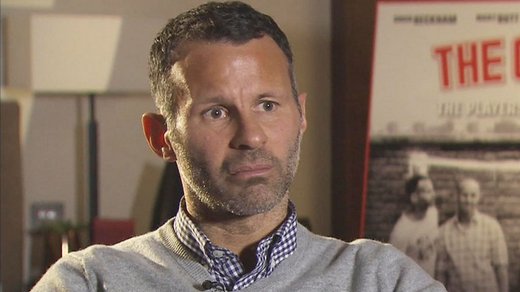
Paul Scholes is a revelation in the Jack Dee role - were you aware of how dry he was beyond the shy persona?
Gabe: Jack Dee is a really good description - he's a really dry character. To spend time with him felt like a real privilege. He was really entertaining, a lovely genuine guy. Everyone loves Paul Scholes, even if you're not a United fan he's one of those players that it's difficult to begrudge what he's done. To interview Paul Scholes for four hours is probably something that's never been done before.
I've heard Paul's not too bothered about attending the premier...it's a bit like how he didn't want to go onto the pitch at Camp Nou after the Bayern Munich game in '99? To paraphrase, he said 'the biggest disappointment was Roy (Keane) missing the game'. Can anyone of such talent really have no ego?
Ben: He's just a really quiet shy bloke. He's not unfriendly but he just doesn't seek the limelight. When we were getting ready to speak to him I'll admit I was a bit worried he might be grouchy or wouldn't have much to say but that couldn't be further from the truth. He's a really straightforward funny bloke. He's very humble, a real family man.
Nicky Butt comes out as a real leader of the group - he's clearly a big character. My perception of him was that he was like quite like Scholes but he's another joker. Is it that they're just proper northerners in that they're comfortable in the company they keep and not that arsed about anyone else?
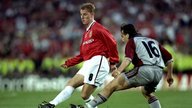 Gabe: Unless you're a proper United fan you might not appreciate just how important a player Nicky Butt was to that team. What was interesting speaking to the other players was the high regard they held Nicky in. In many senses he was that generation's Bryan Robson. He was the first interview we did and it went really well. When we got back into car after it was wrapped up in our excitement we started to sing Nicky Butt songs, which is really something given we're Sunderland fans. It was such a relief after all the planning we'd put in that the players had bought into the idea and seemed willing to give so much of themselves.
Gabe: Unless you're a proper United fan you might not appreciate just how important a player Nicky Butt was to that team. What was interesting speaking to the other players was the high regard they held Nicky in. In many senses he was that generation's Bryan Robson. He was the first interview we did and it went really well. When we got back into car after it was wrapped up in our excitement we started to sing Nicky Butt songs, which is really something given we're Sunderland fans. It was such a relief after all the planning we'd put in that the players had bought into the idea and seemed willing to give so much of themselves.
There's a great bit where Butt says he agreed with Alan Hansen's infamous analysis that 'you can't win with kids'. That's a really interesting line as it exposes how footballers are fallible to doubt like everyone else...
Gabe: They all did to be fair. What is forgotten to an extent is that there was still plenty of experience left in that United team even after the sales of key players (Mark Hughes, Paul Ince and Andrei Kanchelskis) and it was these players that took the class of '92 under their wing and dragged them with them. These guys are so humble that when you speak to them they're so proud to have played for a great team and it's almost as if they don't recognise the part they played in that success, particularly in the first few years. I was like 'guys, you were a pretty key part of this success', but they constantly referenced the part played by the older players. I guess that's why they were so successful. They never got carried away with winning things, or overly courted the limelight. There is this sense that they are just very proud to have played for Manchester United.
I was reading a thread on a United message board about the film and one fan says 'it's bound to be 80 per cent about Beckham' but that's not the case at all. In many ways he's one of the film's more understated characters. How did you find him to deal with? Did you ever worry you might struggle to get him involved?
Gabe: He was a great bloke. Just one of the boys. He was no different and an unbelievable pleasure to work with. From the runner to the tea boy the way they treated the staff on the shoot was first rate. He was a phenomenal bloke. The film isn't about any individuals but the group - the Class of '92. Six guys being a close bunch of mates and doing it together. None of them wanted any special treatment, none of them made any demands. They wanted a simple film about six young lads achieving their dream and that's what I hope we've delivered. It was a real window into a special group of players.
It follows the conventions of a sports film in that it's building up to this great crescendo of the '99 treble but for me it's as much a classic buddy movie as anything else - was that intentional on your part or just inevitable having put six old mates in a room together and started to film?
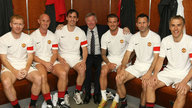
Ben: It was 100 per cent intentional. Thematically it was very much the idea me and my brother had for the film. We made a film 'In the Hands of the Gods' a couple of years back and in many ways that covered similar concerns. It was a buddy movie, a film about friendship and working together to achieve a unified goal. It's something that we love about sport and have always tried to capture on film. It's that camaraderie and the team being bigger than the individual that really inspires us. We're lucky enough as brothers to own a film production company with two of our best mates and we believe in the ethos of the team. The idea of working together to take on the world is something that really appeals, and it's the crux of the class of '92. It's a romantic vision.
What comes across is how these are proper mates, who grew up together as a proper gang. I think it's this element that transcends partisan divides. Anyone can enjoy it - it's definitely not a film for just United fans. Is that a fair comment?
Ben: That's the aim definitely. There are always going to be people who are staunchly anti-United and whatever you produce isn't necessarily going to be for them but I do feel it has a more universal appeal as at its core is a story anyone can relate to. We needed to make it more than what you'd find in a club shop in-house production and I think Universal have allowed us to make that film. There have been plenty of great footballers and plenty of great teams but what is unique about their story is that these are six kids who genuinely grew up together and went on to play for Manchester United. Nicky Butt was with us when we filmed six kids in a park and he said 'just imagine now that these six kids go on to play for United and win the treble. That's what happened to us'. It's an unbelievable story and that's the film in a nutshell really.


